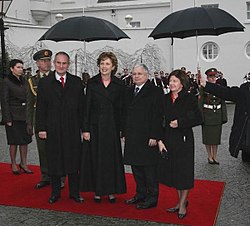Martin McAleese
| Martin McAleese | |
|---|---|

Martin McAleese (left) with wife, Mary McAleese and Lech Kaczyński and his wife.
|
|
| First Gentleman of Ireland | |
|
In office 11 November 1997 – 10 November 2011 |
|
| President | Mary McAleese |
| Preceded by | Nicholas Robinson |
| Succeeded by | Sabina Coyne (First Lady) |
| Senator | |
|
In office 11 May 2011 – 2 February 2013 |
|
| Constituency | Nominated by the Taoiseach |
| Personal details | |
| Born |
Martin McAleese 24 March 1951 Belfast, Northern Ireland |
| Nationality | Irish |
| Political party | Independent |
| Spouse(s) | Mary McAleese |
| Children | 3 |
| Residence | London, United Kingdom |
| Alma mater | |
| Profession | |
| Religion | Roman Catholicism |
Martin McAleese (born 24 March 1951) is a former Senator and First Gentleman of Ireland, as the husband of the 8th President of Ireland, Mary McAleese.
Martin McAleese was born in Belfast and educated at St Mary's Christian Brothers' Grammar School, Belfast and Queens University Belfast from which he obtained a B.Sc.(Hons) in Physics. He played Gaelic football for the Antrim Minors and was captain of the team in 1969. In 1972 after he graduated he moved to Dublin and trained there as an accountant with Stokes, Kennedy, Crowley chartered accountants. He later worked as financial controller for an Aer Lingus subsidiary,
In 1980 he returned to full-time education at Trinity College, Dublin, to train as a dentist. He subsequently moved back to Northern Ireland where he practiced as a dentist in Crossmaglen and Bessbrook, County Armagh.
He married Mary Leneghan in 1976 and they lived first in Scholarstown, County Dublin for a short period and then for almost 12 years near Ratoath, County Meath. The couple have three children, Emma and twins SaraMai and Justin. The family moved to Rostrevor, County Down in 1987 when Martin set up practice in County Armagh.
While his wife served as President of Ireland, McAleese initiated a series of meetings with senior Ulster loyalist paramilitary leaders to pursue peace negotiations. These actions did not take place without controversy, but have been widely viewed as instrumental in bringing loyalist paramilitary groups to peace talks.
...
Wikipedia
